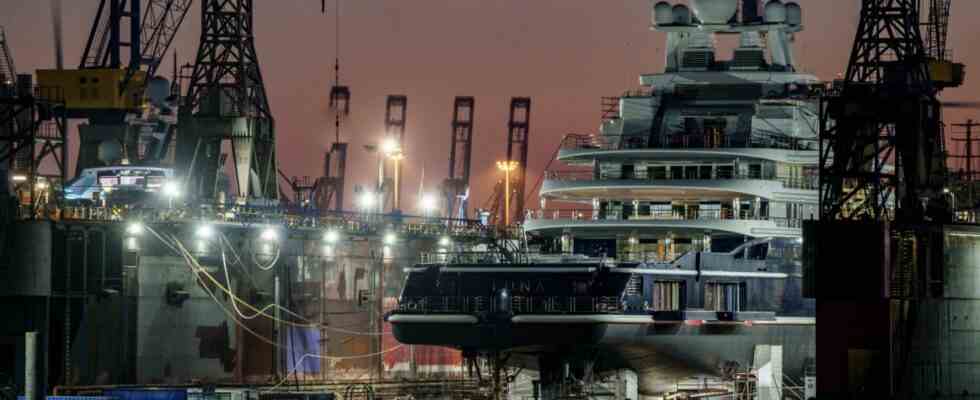The port of Hamburg is Germany’s largest seaport, but it’s still getting tight there. According to SZ information, the German authorities have now “frozen” the second oligarch yacht, the Luna, as part of the Russia sanctions. Before that, the Federal Criminal Police Office (BKA) had to clarify whether the Russian oligarch Farchad Akhmedow was really behind the Liechtenstein Trust, which owns the luxury ship. The pro-Kremlin billionaire from Azerbaijan has been on the EU sanctions list.
The authority was able to disclose the ownership structure, confirmed a spokesman for the BKA. The ship falls under the sanction law. This stipulates that all possessions of a sanctioned person in Europe are “frozen” and are subject to a ban on disposal. The yacht, which is now not allowed to leave the port until further notice, is said to be worth around 400 million euros. It has nine decks, a huge swimming pool and a small submarine. It once belonged to Russian billionaire Roman Abramovich.
Compared to other countries, Germany has recently been a little behind when it comes to chasing oligarch fortunes. But the local authorities are now making good progress with this. At the beginning of April, the sum of the funds frozen in this country amounted to 125 million euros, as emerged from a small request from Left-wing MP Pascal Meiser to the federal government. In the meantime, the sum should have increased to around one billion euros. The Federal Criminal Police Office already had the super yacht in mid-April dilbar fixed in the port of Hamburg. It belongs to the sanctioned sister of the Russian oligarch Alisher Usmanow, whose property on Lake Tegernsee had also previously been frozen by the authorities.
The owner of the Luna, Farkhad Akhmedov, made his fortune in the gas business. The business magazine “Forbes” recently estimated it at around 1.4 billion dollars. Achmedow recently made headlines mainly because of an expensive divorce, which also involved the yacht Luna went. A British court had ordered the oligarch to pay his ex-wife Tatyana Akhmedova around £450m and also authorized the seizure of the yacht. The ship remained in Dubai for two years until a local court reversed the decision from London and the yacht was released again. Most recently, the ship was at the Blohm + Voss shipyard in Hamburg, which will now probably have to pay for the maintenance. A spokesman for the shipyard declined to comment.
So far, Germany has had a harder time with the sanctions than other European countries because the authorities always want to clarify the ownership situation first. Italy, for example, made quicker progress because the reasonable suspicion that a villa or yacht could belong to a sanctioned person is sufficient to freeze the assets until further notice.
Sanctioned persons will have to provide information about their assets in Germany in the future
Soon, however, it should also progress more effectively in Germany. In the meantime, the cabinet has approved the draft for a “Sanctions Enforcement Act I” that the Ministers for Economics and Finance, Robert Habeck (Greens) and Christian Lindner (FDP), have drawn up – as a formulation aid for the parliamentary groups that are supposed to bring it into the Bundestag . The focus is on three points: In the future, it should be possible to determine assets and secure assets until the ownership structure has been clarified. In addition, the authorities are given more powers when transmitting data – for example from the Bundesbank to the Bafin. Above all, however, a “punitive duty of disclosure of the sanctioned persons” should be introduced: They should have to provide information about their assets.
The text of the law states that sanctioned “foreigners and residents” are obliged to report “these funds to the Deutsche Bundesbank and these economic resources to the Federal Office of Economics and Export Control”. Namely “immediately”, “in German”, including the name or the company of the person concerned and with information on the respective value. Anyone who refuses faces imprisonment for up to a year or a fine – not just a fine. In view of the ongoing war, things should be done quickly: the coalition factions are asked to “table a corresponding draft law in the upcoming week of sessions in the German Bundestag”. The item on the agenda is now planned for Thursday.
For the Solandge, the third oligarch yacht that was in the port of Hamburg, it’s too late. Although the previous owner, the oligarch Abusaidovich Kerimov, has been on sanctions lists since March, he sold the yacht to a Saudi just in time. Also Vladimir Putin’s luxury yacht Graceful had left the port of Hamburg shortly before the start of the war.

